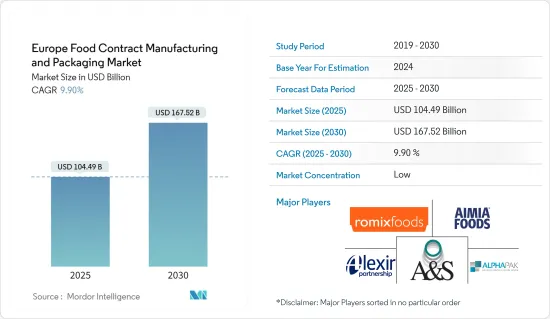
|
시장보고서
상품코드
1632077
유럽의 식품 위탁생산 및 포장 : 시장 점유율 분석, 산업 동향 및 통계, 성장 예측(2025-2030년)Europe Food Contract Manufacturing & Packaging - Market Share Analysis, Industry Trends & Statistics, Growth Forecasts (2025 - 2030) |
||||||
유럽의 식품 위탁생산 및 포장 시장 규모는 2025년에 1,044억 9,000만 달러로 추정 및 예측되며, 예측 기간(2025-2030년) 동안 9.9%의 CAGR로 2030년에는 1,675억 2,000만 달러에 달할 것으로 예상됩니다.

주요 하이라이트
- 유럽 식품 위탁생산 및 포장 산업은 소비자 선호도의 진화, 기술 혁신 및 지속가능성 추구로 인해 큰 변화를 겪고 있습니다. 가장 두드러진 추세는 프라이빗 브랜드 제품에 대한 수요 증가입니다. 소매업체와 슈퍼마켓은 브랜드 제품을 대체할 수 있는 비용 효율적인 제품을 찾고 있으며, 이는 위탁 제조업체가 경쟁력 있는 가격으로 고품질의 식품을 제공할 수 있는 길을 열어주고 있습니다. 이와 함께 건강을 중시하는 소비자들이 자신에게 맞는 식습관 선택을 추구하면서 채식주의자, 무글루텐, 알레르겐 프리 등의 틈새 상품이 눈에 띄게 증가하고 있습니다.
- 지속가능성은 유럽의 식품 제조 환경에서 매우 중요한 요소로 부각되고 있습니다. 소비자들은 환경 친화적인 포장재를 선호하고, 재활용, 생분해성, 퇴비화 가능한 재료를 선호하는 경향이 두드러지게 나타나고 있습니다. 이러한 변화로 인해 식품 제조업체들은 혁신적이고 친환경적인 패키징 솔루션을 만드는 데 능숙한 위탁 생산업체와 협력하고 있습니다. 또한, 식품 폐기물을 줄이고 제조 및 포장에 재활용 재료를 도입하기 위해 노력하는 제조업체와 함께 순환 경제 원칙에 대한 관심도 높아지고 있습니다.
- 기술의 발전은 이 분야에 혁명을 일으키고 있으며, 자동화와 인공지능(AI)이 식품 생산의 중심 무대가 되고 있습니다. 이러한 혁신은 효율성을 높이고, 비용을 절감하며, 제품의 일관성을 보장하고, AI 애플리케이션은 예지보전, 품질 관리, 재고 모니터링에 적용되며, 자동화는 생산의 속도와 유연성을 추구합니다. 패키징 분야에서도 제품의 신선도, 온도, 유통기한에 대한 실시간 인사이트를 제공하는 혁신적인 솔루션이 등장하여 편리함과 투명성을 추구하는 오늘날의 소비자 욕구를 충족시키고 있습니다.
- 건강 및 웰빙 트렌드가 제품 개발에 점점 더 많은 영향을 미치고 있습니다. 면역력 강화, 프로바이오틱스, 고단백질 함유 등 추가적인 건강상의 이점을 제공하는 기능성 식품에 대한 수요가 급증하고 있습니다. 또한, 소비자들은 첨가물이나 방부제를 사용하지 않고, 원재료의 원산지를 쉽게 확인할 수 있는 '클린 라벨' 식품에 매력을 느끼고 있습니다. 이에 따라 식품 제조업체들은 투명성과 건강상의 이점을 추구하는 소비자의 요구에 따라 이러한 클린 라벨 제품을 제조하는 위탁 제조업체를 찾고 있습니다.
- EU의 엄격한 식품 안전 및 표시 의무로 인해 제조업체는 특히 성분의 투명성, 알레르겐 세부 정보, 영양 표시와 관련하여 높은 기준을 유지해야 하며, 이는 소비자들은 식품 공급망에 대한 추적성 강화에 대한 열망이 커지고 있습니다. 이와 함께 소비자들은 식품 공급망에 대한 추적성 강화를 갈망하고 있습니다. 이러한 수요로 인해 제조업체들은 블록체인과 같은 기술을 활용하여 종합적인 제품 추적성을 확보하기 위해 노력하고 있습니다. 이러한 역학 관계의 변화로 인해 위탁 제조업체는 민첩하게 행동하고, 지속가능한 관행을 지지하며, 복잡한 규제망을 뚫고 유럽에서 경쟁력을 유지해야 하는 과제를 안고 있습니다.
- 유럽에서는 수탁 제조업체와 포장업체들이 가격 차익을 줄이기 위해 노력하고 있습니다. 이러한 왜곡의 원인은 원자재 비용 상승, 노동력 부족, 운송비 상승, 엄격한 규제 준수에 대한 요구 등입니다. 원자재 가격 변동, 공급망 혼란, 효율화를 위한 자동화 및 기술 투자가 수익성을 더욱 악화시킵니다. 인건비와 운송비 상승, EU의 엄격한 식품 안전 및 지속가능성 규제로 인한 재정적 부담은 제조업체의 가격 경쟁력을 떨어뜨립니다. 이에 대응하기 위해 많은 제조업체들이 업무 효율성을 개선하고 자동화를 활용하고 틈새 시장과 전문 서비스로 진출하고 있습니다. 하지만 마진에 대한 끊임없는 압박이 있기 때문에 경쟁력을 유지하기 위해서는 지속적인 혁신과 치밀한 비용 관리가 필요합니다.
유럽의 식품 위탁생산 및 포장 시장 동향
가공 및 제조가 큰 시장 점유율을 차지합니다.
- 유럽에서 식품 가공 및 제조 도급 서비스에 대한 수요는 주로 개인 브랜드 제품에 대한 선호도 증가로 인해 급증하고 있습니다. 슈퍼마켓과 소매 체인은 자체 브랜드로 비용 효율적이고 고품질의 제품을 제공할 수 있는 식품 제조 계약업체로 눈을 돌리고 있습니다. 이러한 변화는 소비자들이 경쟁력 있는 가격과 브랜드에 가까운 품질에 매료되어 개인 상표 제품에 점점 더 많은 관심을 갖게 되면서 더욱 두드러지게 나타나고 있습니다. 이에 따라 식품 제조업체들은 일관된 품질과 식품 안전 기준을 엄격하게 준수하면서 이러한 소매업체들의 광범위한 생산 수요를 충족시키기 위해 노력하고 있습니다.
- 건강 및 웰빙 트렌드에 따라 소비자들이 보다 건강하고 기능적인 식품을 적극적으로 찾고 있는 가운데, 건강 및 웰빙 트렌드가 이러한 수요에 박차를 가하고 있습니다. 소비자들은 식물성, 무글루텐, 저탄수화물, 고단백질 식품에 대한 선호도가 높아지고 있습니다. 이러한 변화로 인해 식품 제조업체들은 생산능력을 조정해야 하는 상황에 직면해 있습니다. 특히 소량 생산, 특수 배합, 빠른 생산 처리의 유연성을 제공하는 계약 제조업체는 브랜드가 건강 중심 식품 분야로 진출하는 데 필수적인 역할을 하고 있습니다. 틈새시장을 겨냥한 제품을 생산하는 요령은 식품 브랜드의 성공에 있어 매우 중요한 결정 요인으로 부상하고 있으며, 이는 제조 위탁 서비스에 대한 수요를 증폭시키고 있습니다.
- 지속가능성은 유럽 전역의 위탁생산 수요 증가에 있어 매우 중요한 원동력으로 부상하고 있습니다. 소비자와 규제 당국이 식품업체에 환경적 발자국을 줄이도록 촉구함에 따라 친환경 포장, 지속가능한 조달, 폐기물 최소화를 지지하는 제조업체에 대한 수요가 증가하고 있습니다.
- 또한, E-Commerce 붐과 소비자에게 직접 판매하는 식품의 급격한 증가로 인해 위탁 제조업체는 혁신적인 포장 솔루션을 고안하고 온라인 식품 소매 물류의 복잡성을 해결해야 하는 과제를 안게 되었습니다. 이러한 발전은 지속가능하고 확장 가능한 생산 솔루션을 제공하는 데 능숙하면서도 품질과 환경 보호에 대한 소비자의 기대에 부응할 수 있는 식품 제조업체의 필요성이 증가하고 있음을 강조합니다.
- 2021년에서 2023년까지 독일 편의식품 제조 부문의 수익은 꾸준히 증가하여 2021년 44억 달러에서 2022년 55억 6,000만 달러로 급증하고, 2023년에는 63억 5,000만 달러로 증가할 것으로 예상됩니다. 2023년에는 63억 5,000만 달러로 증가할 것으로 예상됩니다.
- 이러한 상승세는 독일 편의식품 제조업이 소비자 수요 증가에 힘입어 상승세를 타고 있다는 것을 보여줍니다. 바쁜 라이프스타일의 증가, 도시화, 식습관 변화 등의 요인이 즉석식품, 간편식, 냉동식품에 대한 수요를 촉진하고 있습니다. 또한, 건강 지향, 지속가능한 포장, 온라인 식료품 쇼핑의 인기 급상승과 같은 트렌드도 업계 성장을 촉진하고 있습니다.
- 독일 편의식품 부문의 매출 증가는 소비자의 니즈와 변화하는 식습관 트렌드에 대한 대응력을 보여줍니다. 이러한 추세는 더 건강하고, 식물성이며, 알레르겐을 함유하지 않은 식품에 대한 선호도가 점점 더 높아지고 있습니다. 제조업체들이 기술 혁신을 우선시하고 유럽 시장의 변화하는 수요에 대응하고 있기 때문에 이 성장 궤도는 계속 강세를 보이고 있습니다.
괄목할 만한 성장세를 보이는 독일
- 독일의 식품 위탁생산 및 포장 시장은 몇 가지 중요한 요인에 힘입어 상승세를 보이고 있습니다. 소비자들이 더욱 바쁜 라이프스타일을 영위함에 따라 편리하고 바로 먹을 수 있는 제품에 대한 수요가 눈에 띄게 급증하고 있습니다. 이러한 변화로 인해 기업들은 고품질의 바로 먹을 수 있는 식품을 제공하는 데 능숙한 위탁 제조업체와 포장 전문가에게 의존할 수밖에 없게 되었습니다. 또한, 건강 지향적, 유기농, 기능성 식품에 대한 관심이 높아지면서 특수 제조 서비스에 대한 수요가 증가하고 있습니다.
- 식품 가공 및 제조에 대한 수요 증가도 시장 확대의 원동력이 되고 있습니다. 식생활이 다양해지고, 특히 식물성 식품, 유기농 식품, 기능성 식품에 대한 선호도가 높아짐에 따라 제조업체들은 고급 제품의 가공, 포장, 배송을 위탁하는 서비스로 전환하고 있습니다. 이러한 위탁 생산에 의존함으로써 기업은 생산 설비에 많은 투자를 하지 않고도 틈새 제품에 대한 수요 증가에 대응할 수 있습니다. 이러한 추세는 대체 단백질 공급원, 영양 보충제, 반조리 식품 등의 분야에서 두드러지게 나타나고 있습니다.
- E-Commerce의 활성화와 소비자 직접 판매 식품의 급격한 증가는 운송 중 제품의 무결성을 보호하는 특수 포장의 필요성을 증가시키고 있습니다. 온라인 식품 구매가 급증함에 따라 보호와 미적 감각을 겸비한 패키징 솔루션에 대한 수요가 증가하고 있습니다. 밀키트 배송이나 온라인 식료품 쇼핑과 같은 서비스는 장거리 운송에 적합한 효율적이고 고품질의 포장에 대한 필요성을 강조하고 있습니다.
- 기술의 발전은 식품 제조 및 포장 분야에 혁명을 불러일으키고 있습니다. 가스 대체 포장(MAP), 진공 밀봉, 혁신적 포장과 같은 기술은 유통기한을 연장하고 식품의 품질을 유지하는 우수한 기술로 각광받고 있습니다. 또한, 생산에 자동화와 디지털화를 도입하여 효율성과 맞춤화를 향상시킬 수 있습니다. 이러한 진화를 통해 제조업체는 기존 식품 카테고리부터 식물성 식품 및 기능성 식품과 같은 새로운 트렌드에 이르기까지 다양한 식품 카테고리에 대응할 수 있습니다. 이러한 기술 혁신은 창의성과 확장성을 약속하는 위탁 제조 서비스에 대한 수요를 증가시킬 것입니다.
- 독일 식품 산업은 가공 부문 전반에 걸쳐 견조한 수익성을 보이고 있으며, 이는 식품 위탁생산 및 포장 시장에 큰 영향을 미치고 있습니다. 육류 가공 및 육류 가공(541억 2,000만 달러), 아이스크림을 포함한 우유 가공(415억 4,000만 달러)과 같은 선진 부문은 고급 위탁 제조 및 포장 솔루션에 주목하고 있습니다. 이러한 솔루션은 전통 식품 및 가공 식품에 대한 수요 급증에 대응하고 있습니다. 예를 들어, 육류 가공업체들은 안전성을 보장하고 유통기한을 연장하며 엄격한 식품 안전 기준을 준수하는 특수 포장을 위해 위탁 생산업체에 의존하고 있습니다. 마찬가지로, 고급 유제품에 대한 수요가 급증함에 따라 유제품 제조업체들은 우유, 치즈, 아이스크림의 제조 및 포장을 계약 제조업체와 협력하여 생산하고 있습니다.
- 제과 및 파스타 생산(282억 7,000만 달러)도 위탁 생산 및 포장에 크게 의존하고 있습니다. 이러한 서비스는 효율적인 생산과 신선도와 외관을 유지하는 혁신적인 포장을 보장합니다. 반찬류(63억 5,000만 달러)에 대한 소비자의 욕구가 증가함에 따라, 위탁 제조 업체는 신속하고 수준 높은 반찬류 생산과 운송 및 보관 중 제품을 보호하는 특수 포장을 제공하는 데 있어 매우 중요합니다. 또한, 수산물 가공(24억 2,000만 달러 규모)은 특히 냉동, 통조림 및 조리된 식품의 제조부터 포장까지 모든 과정을 감독하는 위탁 제조업체의 혜택을 누리고 있습니다. 요약하면, 독일 식품 산업의 확대와 다양성은 위탁 제조 및 포장 서비스에 대한 수요 증가를 뒷받침하고 있습니다. 기업들은 생산량을 늘리고, 효율성을 높이고, 소비자의 기대에 부응하기 위해 이러한 전문적이고 비용 효율적인 솔루션을 점점 더 많이 찾고 있습니다.
유럽 식품 위탁생산 및 포장 산업 개요
유럽의 식품 위탁생산 및 포장 시장은 대형 다국적 기업 및 특정 식품 산업 부문에 서비스를 제공하는 전문 업체를 포함한 다수의 벤더가 운영되고 있습니다. 각 업체들은 M&A 및 제품 혁신과 같은 전략적 이니셔티브를 통해 경쟁하고 있습니다. 시장에는 다음과 같은 주요 업체들이 있습니다. Romix Foods Limited, Aimia Foods Ltd, Alphapak International Limited, A & S Packing, and Alexir Co-Packers Ltd. 인수합병을 통해 시장 입지를 확대하고, 제품 포트폴리오를 다양화하며, 운영 효율화를 꾀하고 있습니다. 또한, 기업들은 제품 혁신에 집중하고 있습니다. 소비자 니즈를 충족하는 새로운 포장 솔루션과 제조 공정을 개발하여 시장 차별화를 확립하기 위해 제품 혁신에 집중하고 규제 표준을 준수하는 제품 혁신에 집중하고 있습니다.
기타 특전:
- 엑셀 형식의 시장 예측(ME) 시트
- 애널리스트의 3개월간 지원
목차
제1장 소개
- 조사 가정과 시장 정의
- 조사 범위
제2장 조사 방법
제3장 주요 요약
제4장 시장 인사이트
- 시장 개요
- 업계의 매력 - Porter's Five Forces 분석
- 공급 기업의 교섭력
- 구매자/소비자의 협상력
- 신규 참여업체의 위협
- 대체품의 위협
- 경쟁 기업 간의 경쟁 강도
제5장 시장 역학
- 시장 성장 촉진요인
- 가공식품 부문으로부터의 수요 꾸준한 성장
- 통합 솔루션·프로바이더에의 제조·포장 아웃소싱에 주력하는 기업 증가
- 시장 과제
- 수탁 제조업체와 포장업체 가격 마진에의 직면
제6장 식품 위탁생산의 아웃소싱 현재 점유율
제7장 시장 세분화
- 서비스 유형별
- 가공·제조
- 포장
- 창고·풀필먼트
- 국가별
- 영국
- 독일
- 프랑스
- 이탈리아
- 스페인
제8장 경쟁 구도
- 기업 개요
- Romix Foods Limited
- Aimia Foods Ltd
- Norvik Foods
- A & S Packing
- Alexir Co-Packers Ltd
- Alphapak International Ltd
- Agilery
- SternMaid GmbH & Co. KG
- Hearthside Europe
- STOCKMEIER Food GmbH & Co. KG
- Budelpack Poortvliet BV
- Complete Co-Packing Services Ltd
- Marvinpac SA
제9장 투자 분석
제10장 시장 기회와 향후 동향
ksm 25.02.06The Europe Food Contract Manufacturing & Packaging Market size is estimated at USD 104.49 billion in 2025, and is expected to reach USD 167.52 billion by 2030, at a CAGR of 9.9% during the forecast period (2025-2030).

Key Highlights
- Europe's food contract manufacturing and packaging industry is undergoing notable changes spurred by evolving consumer preferences, technological innovations, and a push for sustainability. A prominent trend is the surging appetite for private-label products. Retailers and supermarkets are gravitating towards these cost-effective alternatives to branded items, paving the way for contract manufacturers to deliver high-quality food at competitive rates. Alongside this, there's a notable uptick in vegan, gluten-free, and allergen-free niche offerings as health-conscious consumers pursue tailored dietary choices.
- Sustainability stands out as a pivotal force in Europe's food manufacturing landscape. Consumers prioritize eco-friendly packaging, showing a marked preference for recyclable, biodegradable, and compostable materials. This shift is nudging food manufacturers to partner with contract manufacturers adept at crafting innovative, environmentally-conscious packaging solutions. Furthermore, there's an intensified focus on circular economy principles, with manufacturers striving to curtail food waste and incorporate recycled materials in production and packaging.
- Technological advancements are revolutionizing the sector, with automation and artificial intelligence (AI) taking center stage in food production. These innovations bolster efficiency, cut costs, and ensure product consistency. AI applications span predictive maintenance, quality control, and inventory oversight, while automation champions speed and flexibility in production. Innovative solutions are emerging in packaging, offering real-time insights into product freshness, temperature, and expiration features that resonate with today's consumers' desires for convenience and transparency.
- Health and wellness trends are increasingly influencing product development. There's a burgeoning demand for functional foods, those boasting added health perks like immune-boosting properties, probiotics, and heightened protein content. Moreover, consumers gravitate towards "clean label" foods, characterized by straightforward, recognizable ingredients devoid of additives or preservatives. In response, food manufacturers seek contract manufacturers to craft these clean-label products, aligning with consumer demands for transparency and health benefits.
- Regulatory compliance remains paramount in Europe's food manufacturing arena. The EU's stringent food safety and labeling mandates compel manufacturers to uphold high standards, especially concerning ingredient transparency, allergen details, and nutritional labeling. Coupled with this, consumers are clamoring for enhanced traceability within the food supply chain. This demand drives manufacturers to harness technologies like blockchain, ensuring comprehensive product traceability. As these dynamics shift, contract manufacturers are challenged to be nimble, champion sustainable practices, and navigate the intricate web of regulatory demands to maintain their competitive edge in Europe.
- In Europe, contract manufacturers and packagers grapple with tightening price margins. This strain is attributed to surging raw material costs, labor shortages, escalating transportation expenses, and the demands for stricter regulatory compliance. Ingredient cost fluctuations, disruptions in the supply chain, and the imperative investments in automation and technology for efficiency further challenge profitability. Rising labor and transportation costs and the financial weight of stringent EU food safety and sustainability regulations curtail manufacturers' pricing competitiveness. In response, many manufacturers are honing in on operational efficiency, harnessing automation, and delving into niche markets or specialized services. Yet, the relentless margin pressures necessitate continuous innovation and astute cost management to maintain a competitive edge.
Europe Food Contract Manufacturing & Packaging Market Trends
Processing & Manufacturing to Hold Significant Market Share
- The demand for contract food processing and manufacturing services in Europe is surging, mainly due to a rising preference for private-label products. Supermarkets and retail chains are turning to contract manufacturers for food production, allowing them to present cost-effective, high-quality items under their brands. This shift gains prominence as consumers increasingly gravitate towards private-label goods, drawn by their competitive pricing and quality akin to branded counterparts. Consequently, food manufacturers are stepping up to meet the expansive production demands of these retailers, all while ensuring consistent quality and strict adherence to food safety standards.
- Health and wellness trends fuel this demand, with consumers actively seeking healthier, functional food choices. Preferences are shifting towards plant-based, gluten-free, low-sugar, and high-protein options. This evolution is pushing food manufacturers to adjust their production capabilities. Contract manufacturers, especially those offering flexibility in small-batch runs, specialized formulations, and swift production turnarounds, are becoming indispensable as brands venture into the health-centric food arena. The knack for producing niche-specific products is emerging as a pivotal determinant of success for food brands, amplifying the demand for contract manufacturing services.
- Sustainability is emerging as a pivotal driver for the uptick in contract manufacturing demand across Europe. With consumers and regulatory entities urging food companies to curtail their environmental footprint, manufacturers championing eco-friendly packaging, sustainable sourcing, and waste minimization are witnessing heightened demand.
- Moreover, the e-commerce boom and the surge in direct-to-consumer food sales are prompting contract manufacturers to devise innovative packaging solutions and navigate the intricacies of online food retail logistics. This evolution underscores the growing need for food manufacturers adept at delivering sustainable, scalable production solutions while aligning with consumer expectations for quality and environmental stewardship.
- Germany's Convenience Food Manufacturing Sector has seen its revenue climb steadily from 2021 to 2023, underscoring a burgeoning appetite for convenient food products. Starting at USD 4.40 billion in 2021, the sector's revenue jumped to USD 5.56 billion in 2022, and further ascended to USD 6.35 billion in 2023.
- This upward trajectory signals that Germany's convenience food manufacturing is riding the wave of robust consumer demand. Factors such as increasingly hectic lifestyles, urbanization, and shifting eating habits have fueled the appetite for ready-to-eat meals, quick snacks, and frozen foods. Additionally, the industry's growth is buoyed by trends emphasizing health-conscious choices, sustainable packaging, and the surging popularity of online grocery shopping.
- The revenue surge in Germany's convenience food sector highlights its responsiveness to consumer needs and evolving dietary trends. These trends increasingly favor healthier, plant-based, and allergen-free options. This growth trajectory remains strong, with manufacturers prioritizing innovation and attuning to the European market's changing demands.
Germany to Show Significant Growth
- Germany's Food Contract Manufacturing & Packaging Market is on an upward trajectory, fueled by several pivotal factors. As consumers juggle busier lifestyles, there's a pronounced surge in demand for convenience and ready-to-eat products. This shift compels companies to turn to contract manufacturers and packaging experts adept at delivering high-quality, ready-to-consume food items. Furthermore, an increasing emphasis on health-conscious, organic, and functional foods is paving the way for specialized manufacturing services.
- The escalating demand for food processing and manufacturing is another driving force behind the market's expansion. With food preferences diversifying, especially toward plant-based, organic, and functional foods-manufacturers are leaning more toward contract services for processing, packaging, and delivering premium products. This reliance on contract manufacturing enables companies to cater to the rising demand for niche products without the hefty investment in production facilities. This trend is evident in sectors like alternative protein sources, dietary supplements, and ready-made meals.
- The booming e-commerce landscape and the surge in direct-to-consumer food sales have amplified the need for specialized packaging that safeguards product integrity during transit. As online food purchases soar, there's a heightened demand for packaging solutions that are both protective and visually appealing. Services like meal kit deliveries and online grocery shopping underscore the necessity for efficient, high-quality packaging tailored for long-distance shipping.
- Technological advancements are revolutionizing the food manufacturing and packaging sectors. Techniques like modified atmosphere packaging (MAP), vacuum sealing, and innovative packaging are becoming popular for their prowess in extending shelf life and maintaining food quality. Moreover, infusing automation and digitalization into production boosts efficiency and customization. This evolution empowers manufacturers to cater to various food categories, from established ones to emerging trends like plant-based and functional foods. Such innovations amplify the demand for contract manufacturing services that promise creativity and scalability.
- Germany's food industry is witnessing robust revenues across its processing segments, significantly influencing the Food Contract Manufacturing & Packaging market. Leading sectors, such as slaughter and meat processing (USD 54.12 billion) and milk processing, including ice cream (USD 41.54 billion), are turning to advanced contract manufacturing and packaging solutions. These solutions cater to the soaring demand for traditional and processed food items. For instance, meat processors depend on contract manufacturers for specialized packaging that ensures safety, prolongs shelf life, and adheres to strict food safety standards. Likewise, as the appetite for premium, ready-to-consume dairy products surges, dairy producers are increasingly collaborating with contract manufacturers to produce and pack milk, cheese, and ice cream.
- Baked goods and pasta production (USD 28.27 billion) also leans heavily on contract manufacturing and packaging. These services ensure efficient output and innovative packaging that preserves freshness and visual appeal. With a rising consumer appetite for ready-made meals (USD 6.35 billion), contract manufacturers are pivotal, delivering swift, top-notch meal production and specialized packaging that safeguards products during transit and storage. Furthermore, fish processing (USD 2.42 billion) reaps the benefits of contract manufacturers, overseeing everything from production to packaging, especially for frozen, canned, or ready-to-eat offerings. In summary, Germany's food industry's expansion and variety underscore a growing demand for contract manufacturing and packaging services. Companies are increasingly pursuing these specialized, cost-effective solutions to boost production, enhance efficiency, and align with consumer expectations.
Europe Food Contract Manufacturing & Packaging Industry Overview
The Europe food contract manufacturing and packaging market operates with numerous vendors, including large multinational corporations and specialized firms serving specific food industry segments. Companies compete through strategic initiatives, including mergers and acquisitions and product innovation. The market includes key players such as Romix Foods Limited, Aimia Foods Ltd, Alphapak International Limited, A & S Packing, and Alexir Co-Packers Ltd. Companies pursue mergers and acquisitions to expand market presence, diversify product portfolios, and achieve operational efficiencies. Additionally, firms focus on product innovation to establish market differentiation by developing new packaging solutions and manufacturing processes that address consumer needs and comply with regulatory standards.
Additional Benefits:
- The market estimate (ME) sheet in Excel format
- 3 months of analyst support
TABLE OF CONTENTS
1 INTRODUCTION
- 1.1 Study Assumptions and Market Definitions
- 1.2 Scope of the Study
2 RESEARCH METHODOLOGY
3 EXECUTIVE SUMMARY
4 MARKET INSIGHTS
- 4.1 Market Overview
- 4.2 Industry Attractiveness - Porter's Five Forces Analysis
- 4.2.1 Bargaining Power of Suppliers
- 4.2.2 Bargaining Power of Buyers/Consumers
- 4.2.3 Threat of New Entrants
- 4.2.4 Threat of Substitute Products
- 4.2.5 Intensity of Competitive Rivalry
5 MARKET DYNAMICS
- 5.1 Market Drivers
- 5.1.1 Steady Growth in Demand from Processed Food Segment
- 5.1.2 Companies are Increasingly Focusing on Outsourcing of Manufacturing and Packaging to Integrated Solution Providers
- 5.2 Market Challenges
- 5.2.1 Contract Manufacturers & Packagers are Increasingly Faced with Price Margins
6 Current Share of Outsourcing in Contract Food Manufacturing
7 MARKET SEGMENTATION
- 7.1 By Service Type
- 7.1.1 Processing & Manufacturing
- 7.1.2 Packaging
- 7.1.3 Warehousing & Fulfilment
- 7.2 By Country
- 7.2.1 United Kingdom
- 7.2.2 Germany
- 7.2.3 France
- 7.2.4 Italy
- 7.2.5 Spain
8 COMPETITIVE LANDSCAPE
- 8.1 Company Profiles
- 8.1.1 Romix Foods Limited
- 8.1.2 Aimia Foods Ltd
- 8.1.3 Norvik Foods
- 8.1.4 A & S Packing
- 8.1.5 Alexir Co-Packers Ltd
- 8.1.6 Alphapak International Ltd
- 8.1.7 Agilery
- 8.1.8 SternMaid GmbH & Co. KG
- 8.1.9 Hearthside Europe
- 8.1.10 STOCKMEIER Food GmbH & Co. KG
- 8.1.11 Budelpack Poortvliet BV
- 8.1.12 Complete Co-Packing Services Ltd
- 8.1.13 Marvinpac SA



















